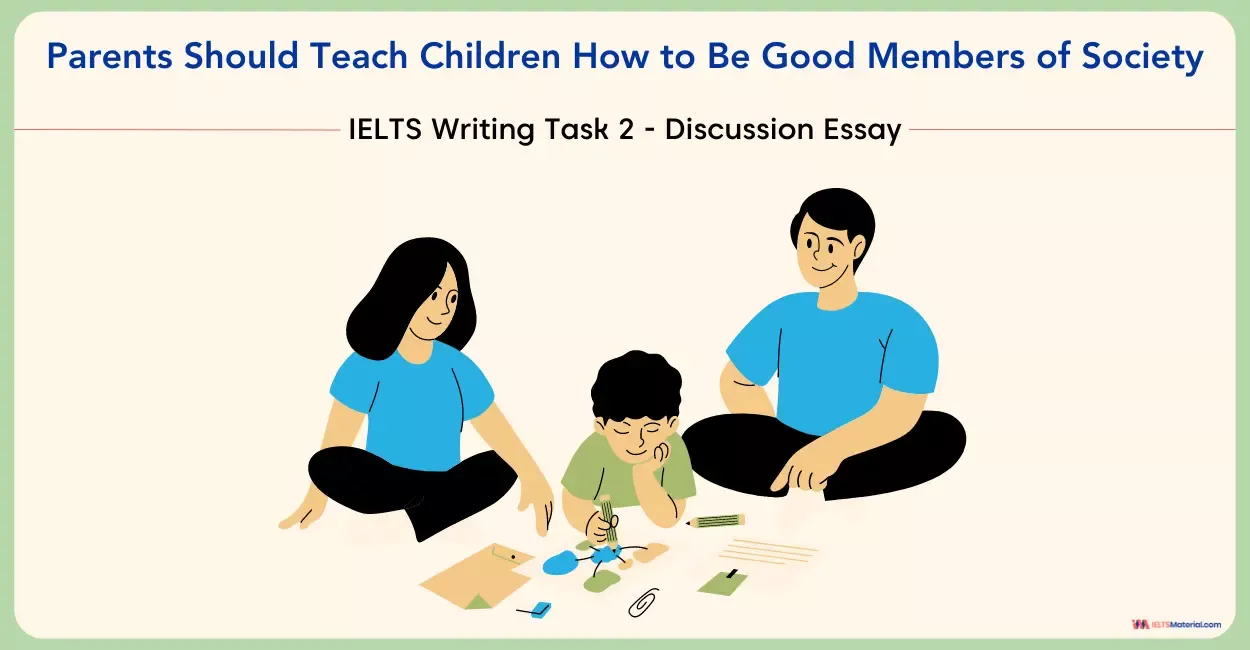IELTS Writing 2 Topic: The tradition that the family gets together to eat meals is disappearing
Table of Contents
Limited-Time Offer : Access a FREE 10-Day IELTS Study Plan!
In IELTS Writing Task 2, students are asked to write a formal essay of at least 250 words, in 4-5 paragraphs based on the given Writing Task 2 essay topics. The task is similar for both Academic and General Training with regards to the type of questions and the scoring, but the topics given for General Training will be slightly easier than Academic. Given below is a cause and effect essay with a sample answer that will help you to practise and get a good score.
The tradition that the family gets together to eat meals is disappearing. What are the reasons? What are the impacts? OR
In many countries, the tradition of families having meals together is disappearing. Why is this happening? What will be the effect of it on the family and society?
Essay Plan for ‘The tradition that the family gets together to eat meals is disappearing’:
Introduction : comment on the statement, state that you will discuss some reasons and impacts.
Paragraph 2 : reasons (1) children eat in front of the TV (2) close-knit family is disappearing – so no regular mealtimes.
Paragraph 3 : impacts (1) on family life – stability of family routine impacts on upbringing of children (2) on children’s health – they develop unhealthy eating habits, leading to disorders.
Conclusion : some reasons can be identified and the impacts are serious.
[do_widget id=custom_html-24]
Essay :
The traditional family mealtime is indeed becoming a thing of the past. There are some reasons which can explain this changing pattern of behaviour, and there are significant impacts on family life and health.
There are two obvious reasons why families no longer share mealtimes as they used to do in the past. Firstly, children are often too impatient to eat at the table, and parents sometimes allow them to have their meal in front of the TV or sitting in front of the computer. Secondly, the close-knit family is disappearing in the face of economic pressures. In single-parent households or families with working mothers, it can be almost impossible to arrange regular times for meals when all the family is together.
The consequences for family life and children’s health are dire. From the perspective of the family, meals taken together are a critical feature of a stable family background. This stability of family routine is an essential factor in shaping children’s personality during their formative years. Family mealtimes are a time to share news, give guidance and to make plans together. In terms of children’s health, family meals were an opportunity to provide all the family members with a healthier diet, based on wholesome home-made food. Without this routine, children are sometimes left to have snacks, or eat junk food at fast-food chains. Health consequences such as obesity and hyperactivity often result when youngsters fail to eat a balanced diet, such as used to be provided at family mealtimes.
In conclusion, some reasons can be identified for the decline in shared family meals, and the impacts are overwhelmingly negative.
[do_widget id=custom_html-47]
Vocabulary :
Family and Children :
- patterns of behaviour
- Meaning: ways of acting and doing things (either positive or negative).
Example: Patterns of behaviour copied from parents often influence the way that children grow up. - a close-knit family
- Meaning: a family having strong relationships with each other, helping with problems and enjoying a lot of time together.
Example: Children who come from a close-knit family generally perform well at school and enjoy a happy childhood. - a single-parent household
- Meaning: a family in which one parent takes care of the children without the help of a husband, wife or partner.
Example: As a result of changes in society, single-parent households are no longer considered unusual. - working mothers
- Meaning: women who have a job and also have to take care of their children. Example: As more and more women have entered the workforce, working mothers have to balance the demands of home and work.
- family background
- Meaning: the details of a person’s family life
Example: Criminals sometimes have a bad family background, neglected or abused by parents. - to shape a child’s personality
- Meaning: to decide or influence the form of a child’s personality.
Example: Parents are very influential in shaping their children’s personality through the example that they set. - formative years
- Meaning: A period of a person’s life, usually childhood, that has a big influence on the person that they become later in life.
Example: UNICEF states that the early childhood years from birth through age 8 are formative years in terms of intelligence, personality and social behaviour.
Food and Diet :
- to provide somebody with a healthier diet
- Meaning: to give somebody a diet which is more healthy than that which they have at present.
Example: Eating only fresh fruit and vegetables provides people with a healthier diet. - home-made food
- Meaning: food which is prepared at home using individual ingredients.
Example: In developed countries, the young generation must rediscover the art of preparing home-made food, as part of a healthy lifestyle. - to have a snack
- Meaning: to eat a small amount of food between main meals.
Example: Unless people are doing vigorous exercise, it is a bad habit to have a snack between meals. - junk food
- Meaning: food that is quick and easy to prepare and eat, but that is thought to be bad for your health.
Example: The consumption of too much junk food is a major factor in the increase in childhood obesity. - fast food chains
- Meaning: groups of shops owned by the same company, serving food to the public.
Example: Healthy eating means avoiding eating out at fast food chains like McDonald’s or Pizza Hut. - to eat a balanced diet
- Meaning: to eat the correct types and amounts of food.
Example: The health benefits of eating a balanced diet are obvious.
Other Vocabulary :
- hyperactivity (noun)
- Meaning: a state in which a person, usually a child, is only able to keep quiet and still for a short period.
Examples: Children who show signs of hyperactivity cause problems for teachers and parents. - overwhelmingly (adverb)
- Meaning: in a way that is very great or very strong.
Example: they voted overwhelmingly against the plan to raise taxes.
Bonus Question:
In many countries, traditions and customs are disappearing. What are the reasons? What should schools and parents do to keep our traditions alive?
Get Evaluated for FREE:
Do you have an essay on this topic? Please post it in the comments section. One of our IELTS trainers will evaluate your essay from an examiner’s point of view and reply to the comment. This service is completely FREE of cost.
More Writing Task 2 Essay Topics
- Is Freedom of Speech Necessary In a Free Society
- In Today’s World of Advanced Science and Technology
- Some People Think That Young People Should Be Required to Do Unpaid Work Helping People in The Community
- The Youth in Many Countries Are Unemployed and Unskilled
- Scientists Say That in The Future Humanity Will Speak the Same Language
Also check :
- IELTS Writing Task 2
- Tips to write introduction in IELTS Writing Task 2
- Tips to write great writing essay
- IELTS Sample essays
- IELTS Writing task 2 Preparation Tips
- Tips to Improve IELTS Writing Skills
- How to get band 8 in IELTS Writing Task 2
- IELTS Writing recent actual test
- Band 9 essays
- Advantage and Disadvantage Essays
- IELTS Writing Answer sheet
Practice IELTS Writing Task 2 based on Essay types
Start Preparing for IELTS: Get Your 10-Day Study Plan Today!
Explore other Problem Solution Essays

Janice Thompson

Recent Articles


Raajdeep Saha
Kasturika Samanta

Akanksha Tripathi





Post your Comments
6 Comments